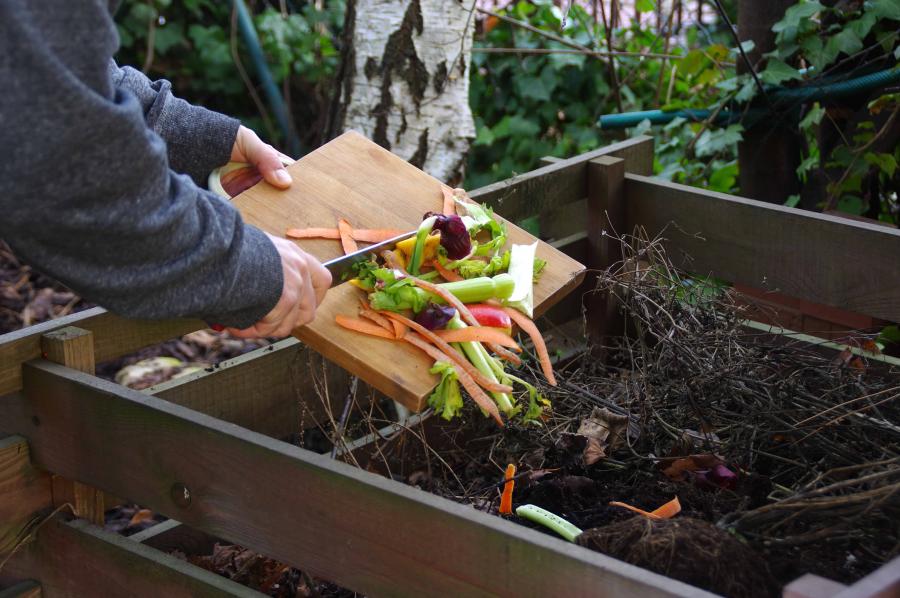A smelly compost bin is far from ideal but not hard to fix, especially with this troubleshooting guide.
If you’re wondering ‘why does my compost smell?’ you’re in the right place.
Here are the five most common reasons compost smells bad
- The compost is too wet
- You’ve added too much green material
- You’ve added meat, fats, or dairy
- The pile to too compacted (not enough oxygen)
- The pile isn’t layered properly
Does compost smell?
A healthy compost bin doesn’t smell bad.
It should have a pleasant, earthy smell as if you were smelling dirt. If it doesn’t smell like this, then something is stopping the compost from decomposing correctly. Common problems including not getting enough oxygen, or getting too much nitrogen.
The only time it’s okay for your compost to have a bad odor is if you’re composting lots of manure. Manure naturally doesn’t smell great. To mask the offensive odor, you can add an extra layer of insulation to your compost pile in the form of straw or newspaper.
Why does my compost bin smell bad?
Read on for the most common reasons compost starts to stink, and advice on how to fix it.
You’ve added too much green material
Composting is a delicate balancing act between green and brown materials. If the ratio becomes out of kilter, then problems will occur. And the problem of too many greens will manifest itself in the form of a stinking, moldy compost pile.
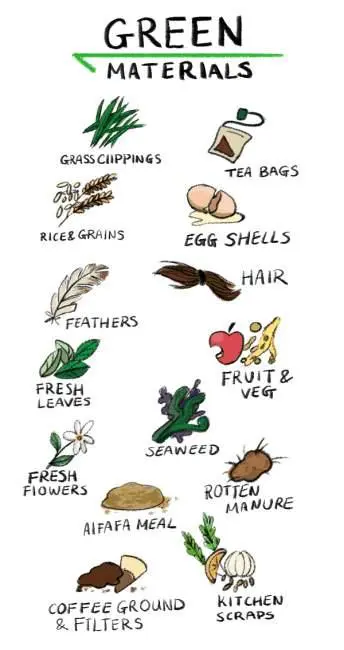
Green materials are nitrogen-rich and include things like kitchen scraps, coffee grounds, and grass clippings.
To restore peace in your compost pile, all you need to do is add in some more brown material and turn the pile to mix them in. Brown materials are rich in carbon and include things like straw, wood chips and newspaper.
The best way to ensure a balanced compost heap long term is to add some brown material every time you add some green and vice versa.
The compost is too wet
Organic matter needs moisture to decompose properly, but there can be too much moisture. If the compost is too wet, this can cause it to become compact, clumpy, and devoid of oxygen.
Luckily, this one’s easy to fix. Simply add more brown materials like leaves or shredded newspaper to soak up the excess moisture. Turning the compost pile will also help dry it out and aerate it.
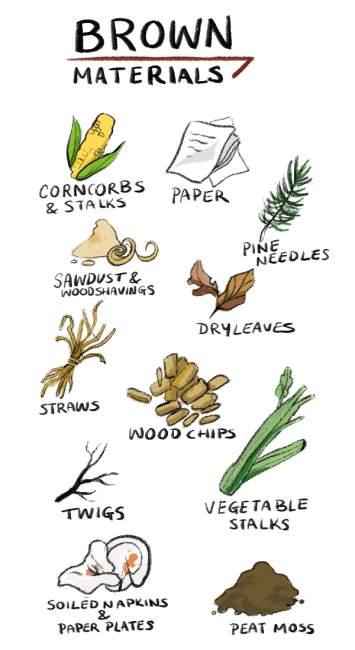
Green materials such as grass clippings tend to release a lot of moisture so can lead to a wet pile. Or it could have been exposed to too much rain. Wet compost is common in the spring as it thaws after freezing over winter.
If you think rain caused the pile to become soggy then covering it with some tarp will protect it from any future rain. Moving it to a different part of the yard where it’ll get more sun will also help the compost to dry out quicker.
Another tip is to elevate your compost pile by placing it on a layer of sticks. This will help improve drainage.
You’ve added meat, fats or dairy
Animal products and fats are notorious for being difficult to manage in a compost pile. They give off a putrid odor and can attract unwanted visitors to your pile such as rats, dogs, and raccoons.
If you think this is your problem, try and arrange the pile so that most of the meat and dairy products are in the middle. They’ll break down quicker here and will have more insulation to stop any bad odors from escaping.
If you find you have a consistent pest problem even after insulating the compost then swapping to an enclosed continuous composter, or a tumbler bin could help.
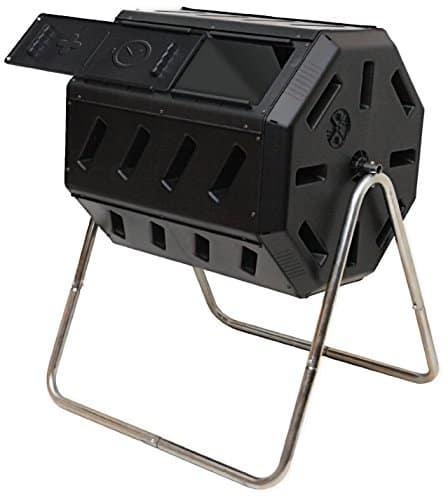
These bins have solid walls and lids designed to keep pests out. The walls also stop bad odors from escaping.
Going forward limiting how much of these materials you add will keep any bad smells at bay. If you need to compost meats and dairy, then a good solution is to get a bokashi bin. Bokashi is a relatively new odorless technique that can quickly compost meat, fish, dairy, and greasy foods. Read more about it in our guide to bokashi.
The compost is too compacted (no oxygen)
Some materials like grass clippings tend to compact and create impenetrable layers in your compost. These layers will stop oxygen circulating freely and lead to the compost pile becoming oxygen-deficient, therefore encouraging anaerobic decomposition.
Anaerobic composting smells much worse than an aerobic process and is also slower.
Turning the pile will break up the compacted material and ‘fluff up’ the compost. Adding some more structured elements to your compost pile such as wood chips or shredded leave will help prevent the pile from becoming too compacted again.
The pile isn’t layered correctly
You could have perfected the ratio of browns to greens in your compost pile, but if they’re not mixed together, then the compost will start to stink.
The green material needs to be well integrated with the brown material for the process to work correctly. If you think your compost isn’t well-distributed, then give it a good turning until it’s well mixed. Don’t forget to add an extra layer of brown material on top of the pile to make sure no green material is exposed.
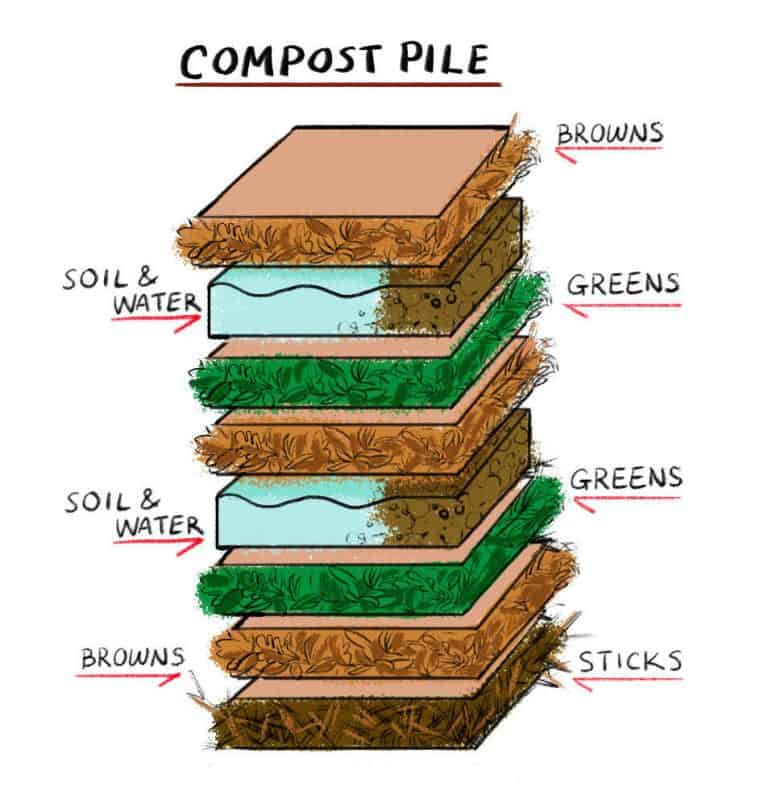
The best way to ensure well-mixed compost is to use the lasagne method of composting. This is where you build the compost pile in alternating layers of brown and green.
Smell Diagnosis
When you have smelly compost, the first thing to do is work out what exactly it smells like. This will give a good indication of what the problem is.
Why does my compost smell like ammonia?
Compost piles that smell like ammonia or sewage are suffering from nitrogen overload. The excess nitrogen is given off in the form of NH3 gas, which is where the ammonia smell comes from. Either you have too many green materials, or the compost isn’t properly mixed.
Why does my compost smell like rotten eggs?
Compost piles that smell like rotten eggs are lacking in oxygen. Too little oxygen results in anaerobic conditions as the aerobic microbes die off. Hydrogen sulfide is a by-product of anaerobic composting and smells like rotten eggs.
How can I keep compost in my kitchen without it smelling?
Kitchen compost bins are a convenient way to store your scraps until you’re ready to put them in your main compost bin. Lots of people worry about them smelling as the food starts to decompose, but if you stick the following steps, then this won’t be a problem.
- Buy a compost bin with a charcoal filter and make sure to replace the filters every few months, so they don’t wear out. Charcoal filters trap any smells that do occur so they can’t escape into your kitchen. We recommend this stainless steel filtered countertop bin which comes with an airtight lid so it won’t attract pests. It’s also molded in one piece, so it’s very easy to clean. The smooth walls mean food won’t get stuck in hard to reach corners and start rotting.
- Add some brown materials to the bottom of the bin to soak up any moisture. A few layers of shredded newspaper in the bottom of the bin will go a long way to controlling odors. There’s also the added benefit of introducing some carbon to the bin to kick start the composting process.
- Empty the bin every 2-3 days. Unfortunately, there’s no way to stop the food in the bin from decaying. But emptying it regularly will make sure you get rid of the scraps before they start smelling too much.
How to keep my compost from smelling long term
Once you’ve fixed your smelly compost, the next thing to think about is how to keep it smelling earthy in the long run. Here are three tips.
Turn your compost
Turning your compost regularly is one of the most effective ways to solve most problems you may encounter. It’s the compost equivalent of restarting your computer. Turning a big heap of compost can be a lot of effort and take time. If you don’t have time time to turn the pile yourself, then it’s worth considering a compost tumbler. These only take a few seconds to turn, and many have spikes on the inside to aid the mixing process.
Keep the waste small
Putting in a bit of extra work chopping, shredding, or chipping your waste before you put it in your compost pile will help speed up the composting process, minimizing the risk of smelly compost.
Keep the carbon:nitrogen ratio well balanced
Carbon and nitrogen the two most essential ingredients for compost. The ideal ratio is 30 parts carbon to 1 part nitrogen, which is roughly equal to 3 parts brown to 1 part green. If you stick to this ratio, you’ll avoid creating a soggy, compact pile.
